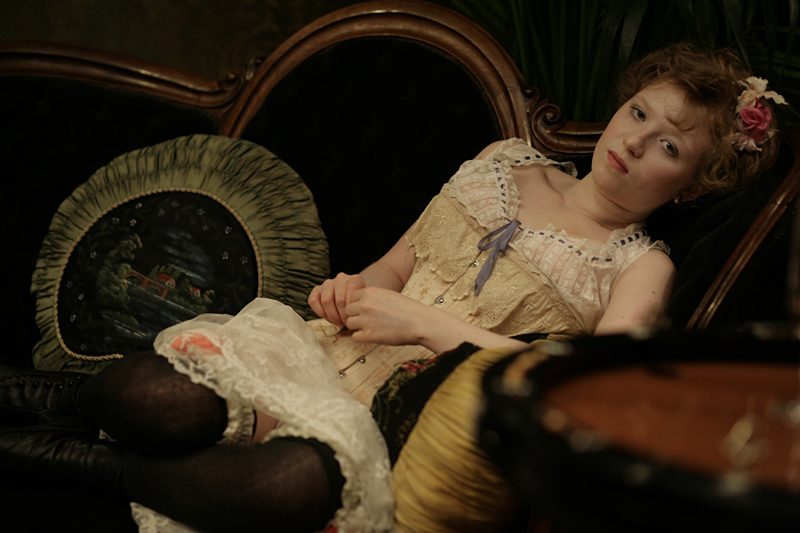Willkommen to the new Sacha Baron Cohen extravaganza Brüno (directed by guerrilla filmmaker Larry Charles), which is often hilarious. Is it a minstrel show? A co-option of gay culture? Evidence of new tolerance or ineradicable prejudice? Or is it just using queerness to talk about something else?
The eye-batting, lip-pursing, petulantly self-regarding host of the Austrian TV show Funkyzeit, Brüno is a star—and regarded as such from the disco flourish that first heralds his appearance in hot-canary lederhosen to his final triumph before a wrestling-fan rabble bellowing “straight pride.” Brüno itself is vulgar vaudeville of the highest order.
Baron Cohen casts the straight world as his straight man, although it hardly seems likely that audiences will respond as indignantly as the “real-life” focus group assembled to evaluate the pilot for Brüno’s American TV show, A-List Celebrity Max-Out mit Brüno. Still, Brüno has something to offend everyone—or had. Just before the movie’s Los Angeles premiere, a scene in which Brüno “interviews” a befuddled LaToya Jackson—coaxing her to imitate brother Michael as she sits perched on the back of a middle-aged Mexican laborer stolidly on his hands and knees (the only available furniture)—was cut out of deference for the Jackson family. Mocking Michael Jackson would be blasphemy. This is unfortunate, because the late sacred monster and his newly resurrected fan base are intrinsic to Brüno‘s critique of show business.
Brüno’s irrepressible outré sexuality is only the most provocative aspect of his mad exhibitionism. Brüno burlesques homophobia the way Borat did anti-Semitism, but its true subject is the nature of celebrity. Or rather: the dialectic between celebrity and otherness. Le freak, c’est chic. To the degree that Brüno has a plot, it follows its “schwartz-listed” fashionista to Hollywood, where he hopes to become “the biggest Austrian superstar since Hitler.” (Hitler? In another bit of misplaced tact, Brüno’s gubernator compatriot is conspicuously unmentioned.)
Like any star, Baron Cohen resolves contradictions—he’s an open-minded bigot, an amoral moralist, an honest con man, a clever fool, and a performer whose crudeness is filled with grace. Even more than Borat, Brüno attests to the actor’s skill at verbal and physical comedy. Baron Cohen’s fluent falsch Deutsch rivals the bluster Mel Brooks used to write for Sid Caesar—although not even Brooks would have dared use Auschwitz as a synonym for arschloch (asshole). Whether wreaking havoc on a fashion show or pantomiming a blow job or using a martial-arts instructor as a foil to dramatize homosexual panic, Baron Cohen is a superb clown. He’s also fearless—prancing into a “God Hates Fags” demonstration, outrageously cruising a group of backwoods hunters (whom he compares to “the Sex and the City girls”), and crashing a hetero swingers’ party (which takes Brüno pretty close to an X rating). There’s a reason why the ring in the Arkansas wrestling arena is surrounded by a chain-linked, barbed-wire-topped fence—Baron Cohen’s final gag might well have gotten him crucified.
Even after Borat, Baron Cohen manages to confound ordinary people and dim-witted professionals—although the setups and supportive editing strategies seem here more apparent. He pranks hotel room service with an elaborate S&M tableaux and visits a Christian “therapist” who specializes in converting gays to straights. (“Can I still play the clarinet? What if I put a flute up my shtinker?”) LaToya aside, a few fellow celebs fall for his line. Is Congressman Ron Paul, whom Brüno chooses to confuse with RuPaul, really that clueless? Or was the erstwhile Republican presidential candidate only desperate for publicity? It hardly matters. That desperation is Brüno‘s universal principle. Thus, Baron Cohen reserves his most brutal satire for the use of accessory children.
Returning from safari, Brüno unpacks his souvenirs before an incredulous crowd surrounding the airport baggage carousel; the trinkets include a six-month-old African adoptee. Naturally, he uses the baby to get himself on a Springer-type TV show, infuriating a mainly African-American audience by explaining that little O.J. is his “dick magnet.” Others may be appalled when Brüno haughtily auditions a series of avid stage parents, getting them to agree to allow their babies to act on a set lit by phosphorus, work with “antiquated machinery,” dress up as Nazis, dramatize the crucifixion of Christ, and, if necessary, submit to liposuction. Outrage is entertainment! Baron Cohen has predicated Brüno on the idea that Americans will do almost anything to achieve their 15 minutes of fame—as will Brüno, not to mention his inventor. What’s more, we dig it.
Funny as it is, Brüno could not be as shockingly uproarious as Borat. No matter how well retold, a joke necessarily loses explosive force the second time around. But a great gag is a thing of beauty forever—so too a comic performance. As the primitive Asiatic “other” Borat (at once crypto-Jew and rabid anti-Semite), Baron Cohen articulated a violent antipathy, inciting the unwary to agree with him. As the sophisticated, though stupid, European “other” Brüno (at once narcissistic celeb and frantic wannabe), Baron Cohen courts that antipathy himself. In both cases, he confounds his audience, creating a persona we hate to love.








